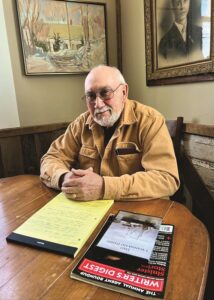
Fishing hundreds of miles off the coast of Provincetown in 1979, the F/V Little Infant was caught in a raging tempest. Peter Cook, a crewman on the 90-foot scalloper, could see only one other boat out there, the F/V Leland J. “That boat got in trouble,” says Cook, “and started taking on water.”
The Little Infant’s crew watched the other boat sink, “and then,” Cook continues, “we picked six guys out of the life raft. Once the six men were on board our boat, I walked into the wheelhouse and Captain Adams said, ‘Well, Pedro, that went well. How are those men?’ He always called me Pedro. And I said, ‘They are shaken up but lucky to be alive, thanks to you.’ He pointed out the window and said, ‘Take a look out there. I’ll bet you never saw anything like that before.’ And the other boat had turned bottoms up and was upside down, drifting away. And I said, ‘No, I never did, George.’ And he said, ‘Well, that’s a story you can tell your grandchildren someday.’ So, I wrote the story.”
That story from Cook’s fishing days is featured in this year’s Provincetown Portuguese Festival book. Cook will also retell the story at the Portuguese Writers and Poets reading at the Crown & Anchor from 2 to 4 p.m. on Friday, June 23.
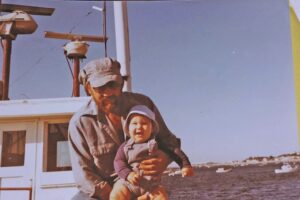
Cook, 78, is a writer, a filmmaker, a retired fisherman and auto mechanic, and a third-generation Provincetown native. In 1872, Cook’s then 16-year-old grandparents arrived in Provincetown from the Azores, the archipelago of volcanic islands in the Atlantic nearly 900 miles west of Portugal. Cook was born in 1945 in his uncle’s house on the corner of Court and Cudworth streets. That same year, his father bought a house on Mechanic Street in the West End, and Cook has lived there ever since.
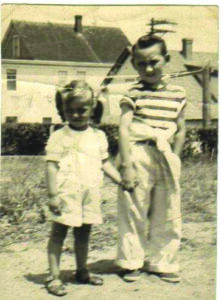
“I grew up there,” he says. “Then I lived upstairs with my young family. I took care of my parents there, and when they passed, I took over the downstairs, and I have a son that lives upstairs. We’re deep-rooted in Provincetown.”
Cook is currently writing the story of his family’s passage from the Azores. In his older age, he says, he has become more dedicated to illuminating this family history.
“I take care of the family plot at the cemetery: grandpa, grandma, my parents, and some of my aunts and uncles,” he says. “When I’m there thinking and praying and looking at the stones, I’m thinking of the family and I’m saying, ‘There’s got to be so much more to this story than this place.’ So, I’ve tracked it back.” Writing stories has brought that history to life. “Numbers and names on paper are bland,” says Cook. “But if you tell it in a story, it has a lot more substance and meaning.”
Cook founded a writer’s group that meets every Tuesday at the Provincetown Commons. The purpose of the group, made up of people who grew up in Provincetown, is to write their memories. Together, they keep their histories from vanishing.
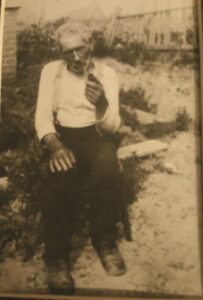
“There are so many streets in Provincetown that have only one or two real locals,” says Cook. He means people who were born and raised in Provincetown. “Our history in Provincetown, as far as Portuguese ancestry, is disappearing. And unfortunately, the blessing of the fleet is getting smaller and smaller each year. Soon it won’t be anymore. The handwriting is on the wall, so I think it’s important that we get our stories out. I tell my writing group, ‘If we don’t write this stuff down, who’s going to write it?’ ”
Writing isn’t the only way Cook has told the stories of his family in Provincetown. With Paul de Ruyter, he produced and directed the film Dad I Wanna Go Fishin’, which premiered at the Provincetown International Film Festival in June 2012. The film includes footage taken by Cook, his father, and his brother. They capture the images and sounds of commercial fishing on the F/V Little Infant in the 1950s, ’60s, and ’70s.
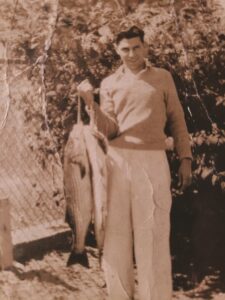
In the film’s narration, Cook says, “We were fishermen. We worked hard; we loved it; we hated it. The romance ends when you leave the dock. That’s the way it is. It’s in the blood.”
This fall, Cook will travel to the Azores to see for the first time the village of São Pedro on the south coast of São Miguel Island, where his grandparents are from. He knows of places there that hold his history: the church that his family attended and the birthplaces of his grandmother and grandfather.
“As I like to say, I’m going ahead through the days and back through the years,” says Cook.
Cook remains an engaged member of his family and the Provincetown community, but he finds solace in the past, writing and sharing it.
“I live my life for my wife and my grandchildren,” he says. He moves forward, but in his mind and heart and soul, he says, he goes back through time.



